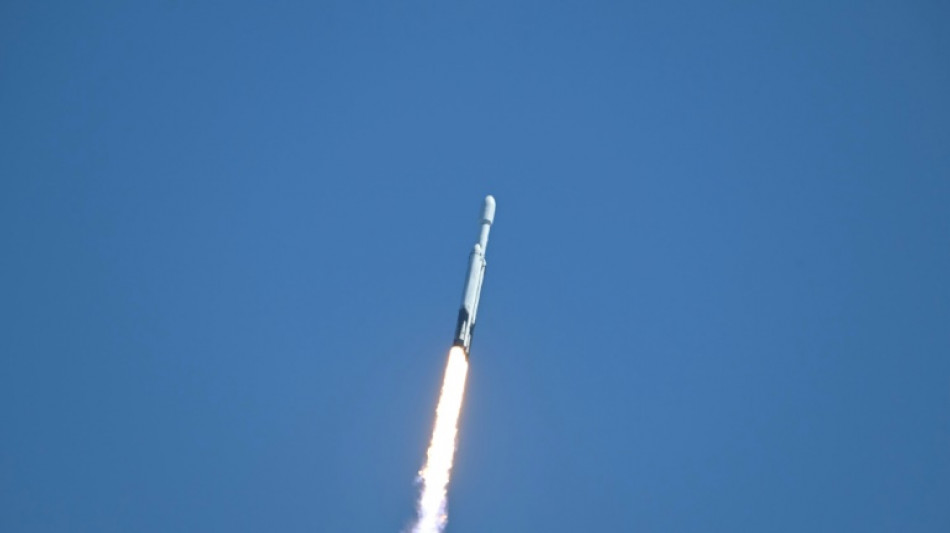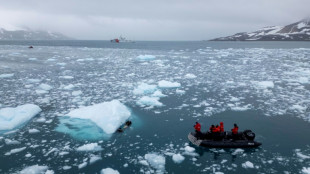
-
 Ski great Vonn finishes 14th on World Cup return
Ski great Vonn finishes 14th on World Cup return
-
Scholz visits site of deadly Christmas market attack

-
 Heavyweight foes Usyk, Fury set for titanic rematch
Heavyweight foes Usyk, Fury set for titanic rematch
-
Drone attack hits Russian city 1,000km from Ukraine frontier

-
 Former England winger Eastham dies aged 88
Former England winger Eastham dies aged 88
-
Pakistan Taliban claim raid killing 16 soldiers

-
 Pakistan military courts convict 25 of pro-Khan unrest
Pakistan military courts convict 25 of pro-Khan unrest
-
US Congress passes bill to avert shutdown

-
 Sierra Leone student tackles toxic air pollution
Sierra Leone student tackles toxic air pollution
-
German leader to visit site of deadly Christmas market attack

-
 16 injured after Israel hit by Yemen-launched 'projectile'
16 injured after Israel hit by Yemen-launched 'projectile'
-
Google counters bid by US to force sale of Chrome

-
 Russia says Kursk strike kills 5 after Moscow claims deadly Kyiv attack
Russia says Kursk strike kills 5 after Moscow claims deadly Kyiv attack
-
Cavaliers cruise past Bucks, Embiid shines in Sixers win

-
 US President Biden authorizes $571 million in military aid to Taiwan
US President Biden authorizes $571 million in military aid to Taiwan
-
Arahmaiani: the Indonesian artist with a thousand lives

-
 Indonesians embrace return of plundered treasure from the Dutch
Indonesians embrace return of plundered treasure from the Dutch
-
Qualcomm scores key win in licensing dispute with Arm

-
 Scientists observe 'negative time' in quantum experiments
Scientists observe 'negative time' in quantum experiments
-
US approves first drug treatment for sleep apnea

-
 US drops bounty for Syria's new leader after Damascus meeting
US drops bounty for Syria's new leader after Damascus meeting
-
Saudi man arrested after deadly car attack on German Christmas market

-
 'Torn from my side': horror of German Christmas market attack
'Torn from my side': horror of German Christmas market attack
-
Bayern Munich rout Leipzig on sombre night in Germany

-
 Tiger in family golf event but has 'long way' before PGA return
Tiger in family golf event but has 'long way' before PGA return
-
Pogba wants to 'turn page' after brother sentenced in extortion case

-
 Court rules against El Salvador in controversial abortion case
Court rules against El Salvador in controversial abortion case
-
French court hands down heavy sentences in teacher beheading trial

-
 Israel army says troops shot Syrian protester in leg
Israel army says troops shot Syrian protester in leg
-
Tien sets-up all-American NextGen semi-final duel

-
 Bulked-up Fury promises 'war' in Usyk rematch
Bulked-up Fury promises 'war' in Usyk rematch
-
Major reshuffle as Trudeau faces party pressure, Trump taunts

-
 Reggaeton star Daddy Yankee in court, says wife embezzled $100 mn
Reggaeton star Daddy Yankee in court, says wife embezzled $100 mn
-
Injured Eze out of Palace's clash with Arsenal

-
 Norway's Deila named coach of MLS Atlanta United
Norway's Deila named coach of MLS Atlanta United
-
Inter-American Court rules Colombia drilling violated native rights

-
 Amazon expects no disruptions as US strike goes into 2nd day
Amazon expects no disruptions as US strike goes into 2nd day
-
Man Utd 'more in control' under Amorim says Iraola

-
 Emery insists Guardiola 'still the best' despite Man City slump
Emery insists Guardiola 'still the best' despite Man City slump
-
US confirms billions in chips funds to Samsung, Texas Instruments

-
 English Rugby Football Union chairman quits amid pay row
English Rugby Football Union chairman quits amid pay row
-
Major reshuffle as Trudeau faces party pressure, Trump attacks

-
 Gatland remains as Wales boss but must 'change fortunes on the pitch'
Gatland remains as Wales boss but must 'change fortunes on the pitch'
-
Argentina's dollar craze cools under greenback-loving Milei

-
 Medici secret passageway in Florence reopens after refit
Medici secret passageway in Florence reopens after refit
-
Anger after Musk backs German far right

-
 Arteta says 'best is yet to come' as he marks five years at Arsenal
Arteta says 'best is yet to come' as he marks five years at Arsenal
-
Pereira happy to achieve Premier League 'target' with Wolves

-
 'Dark lull' in German energy transition sparks political debate
'Dark lull' in German energy transition sparks political debate
-
Russian skaters allowed to compete as neutrals in 2026 Winter Olympics


NASA probe Europa Clipper lifts off for Jupiter's icy moon
NASA probe Europa Clipper lifted off from the US Kennedy Space Center on Monday, bound for an icy moon of Jupiter to discover whether it has the ingredients to support life.
Lift-off took place aboard SpaceX's powerful Falcon Heavy rocket. The probe is set to reach Europa, one of Jupiter's many moons, in five and a half years.
The mission will allow the US space agency to uncover new details about Europa, which scientists believe could hold an ocean beneath its iced-over surface.
"With Europa Clipper, we're not searching for life on Europa, but we're trying to see if this ocean world is habitable, and that means we're looking for the water," said NASA official Gina DiBraccio, ahead of the launch.
"We're looking for energy sources, and we're really looking for the chemistry there, so that we can understand what habitable environments might be throughout our whole universe," she added.
If life's ingredients are found, another mission would then have to make the journey to try and detect it.
"It's a chance for us to explore not a world that might have been habitable billions of years ago" like Mars, Europa Clipper program scientist Curt Niebur told reporters, "but a world that might be habitable today, right now."
The probe is the largest ever designed by NASA for interplanetary exploration.
Europa Clipper is 30 meters (98 feet) wide when its immense solar panels -- designed to capture the weak light that reaches Jupiter -- are fully extended.
- Primitive life? -
While Europa's existence has been known since 1610, the first close-up images were taken by the Voyager probes in 1979, which revealed mysterious reddish lines crisscrossing its surface.
The next probe to reach Jupiter's icy moon was NASA's Galileo probe in the 1990s, which found it was highly likely that the moon was home to an ocean.
This time, the Europa Clipper carries a host of sophisticated instruments, including cameras, a spectrograph, radar and a magnetometer to measure its magnetic forces.
The mission will look to determine the structure and composition of Europa's surface, its depth, and even the salinity of its ocean, as well as the way the two interact -- to find out, for example, if water rises to the surface in places.
The aim is to understand whether the three ingredients necessary for life are present: water, energy and certain chemical compounds.
If these conditions exist on Europa, life could be found in the ocean in the form of primitive bacteria, explained Bonnie Buratti, the mission's deputy project scientist.
But the bacteria would likely be too deep for the Europa Clipper to see.
- 49 flybys -
The probe will cover 2.9 billion kilometers (1.8 billion miles) during its journey, with arrival expected in April 2030.
The main mission will last another four years.
It will be subjected to intense radiation -- the equivalent of several million chest x-rays on each pass.
Some 4,000 people have been working on the $5.2 billion mission for around a decade.
NASA says the investment is justified by the importance of the data that will be collected.
If our solar system turns out to be home to two habitable worlds (Europa and Earth), "think of what that means when you extend that result to the billions and billions of other solar systems in this galaxy," said Niebur, the Europa Clipper program scientist.
"Setting aside the 'Is there life?' question on Europa, just the habitability question in and of itself opens up a huge new paradigm for searching for life in the galaxy," he added.
The Europa Clipper will operate at the same time as the European Space Agency's (ESA) Juice probe, which will study two other moons of Jupiter -- Ganymede and Callisto.
X.M.Francisco--PC



